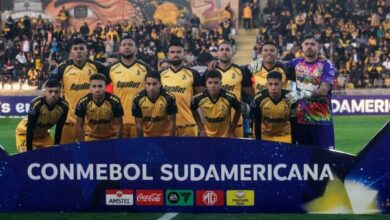The US Ambassador in Ecuador Affirms That Soccer Clubs are Used to Launder Money
The United States ambassador to Ecuador, Michael Fitzpatrick, highlighted money laundering in Ecuadorian soccer, identifying it as a new avenue of corruption. The accusation follows comprehensive measures by the Pro League to ensure financial transparency and regulatory compliance at clubs.

Photo: Michael Fitzpatrick
EFE
Escucha este artículo
Leer en español: El embajador de EE.UU. en Ecuador afirma que clubes de fútbol son usados para lavar dinero
Defying National Passion: Football as a Way of Money Laundering
The United States ambassador to Ecuador, Michael Fitzpatrick, stated that money laundering from corruption has now extended in the Andean country "to the national passion, soccer," through its clubs.
In a speech given during an event commemorating the 20th anniversary of the United Nations Convention against Corruption, the ambassador noted on Thursday that "the corrupt do not only move chips in the public sector."
"They are laundering their money in real assets, bank accounts, and fictitious export companies. Their front men are now involved in even the national passion: football, using some teams to launder their money – and their faces," Fitzpatrick said in his speech.
Response from the Pro League: Transparency and Rigorous Audits
But the president of the Pro League, Miguel Ángel Loor, stressed this Friday on his X account (formerly Twitter) that "like never before in the history of Ecuadorian football, the first division professional clubs in the Pro League have audited balance sheets since 2019 (LigaPro administration start date).
In addition, he recalled that the Pro League, which brings together the clubs of the first and second divisions of Ecuador, is also examined by one of the main international private auditors, with accounts presented to the public on its website.
LigaPro's current Integrity Director was head of Criminal Fraud at the United States Embassy until last year, he added.
Likewise, clubs are required to report to the Financial Analysis Unit (UAFE) since this year, and the League signed an agreement with the Internal Revenue Service (SRI), the tax administration, to collaborate with advice and information.
"Was the message for first division clubs, second category clubs, or amateur clubs?" Loor asked on the social network.
The president of the Ecuadorian professional football association added that they will continue investigating and will always be ready to collaborate with the control institutions in case they require any information, "but be careful because the message spreads (in the media) to dirty clubs and people who have complied with the internal regulations to the letter".
Fight against Corruption: Urgency for Strategic Measures
The ambassador highlighted that Ecuador is in a "moment of opportunity" with a new democratic government and a new National Assembly.
Furthermore, after almost five years, Ecuador now has a new chief comptroller, he noted, noting that "this is a crucial opportunity to control the assets of public officials, identify irregularities and prevent illicit enrichment.
He noted that the new Government can also promote strategic changes, such as the true implementation of asset forfeiture to seize assets from corruption and organized crime.
Challenge for the New National Assembly: Regulate to Confront Organized Crime
Domain forfeiture should be in Ecuador what it is in other countries: one of the strongest tools in the fight against corruption, he said.
He commented that "if the corrupt and the drug traffickers – and their political and economic protectors – know that they are not really going to earn any money with their illegal actions, they are not going to take the risks."
He noted that between 2016 and 2020, Ecuador seized just $6 million in illicit assets, while $134 million in criminal fines remain uncollected. Millions of dollars in seized assets are not sold but are held at the State's expense.
Read also: NFL's Global Strategy Includes Latin America as a Key Market
"These figures are not only laughable, but they also represent resources that are not being used in the fight against organized crime," he noted.
He added that the new National Assembly (Parliament) has the opportunity to think big – and approve rules to create specialized regulations to confront the greatest danger facing the country today – the national and transnational networks of organized crime.




